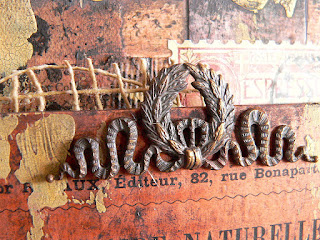Hi, servus and welcome to an "experimental post" today!
Being on the DecoArt Mixed Media design team I got a sample of the new
DecoArt pouring medium to play with and as I had so much fun and have tried several techniques I decided to do a short write up and share my experiences with it so far.
First of all let me tell you that it really is such great fun to play with - but also takes patience afterwards as the drying process can take up to two days - depending on how thick the layer of poured on paints is and on weather and climate of course.
Even if the top coat has already turned into a dry to the touch skin the paint underneath still is wet and liquid and if you touch your project too soon the top skin will tear and the spilling paint from underneath will ruin your design! So fun first - patience after! No heat drying - unless you want to create a kind of crackled look (which will be shown later in the post).
For starters I decided to experiment with
DecoArt Americana paints as suggested in the leaflet that came with the pouring medium and top coat. Note that other paints from DecoArt will need a different mixing ratio (given in the directions on the containter and in the leaflet). For starters I picked the ones I had the largest containers of - black and white. I added Green Mist to have a third colour.
The image shows the plastic cups with one part pouring medium and one part Americana paints added (having eyeballed the amounts of paint and medium added to the cups) -
before I stirred the mixes with Popsicle sticks.
These are the results I got after I had used up all of the paint from the cups - you see a little goes a long way (at least if you do not just use the paints for pouring) !
Very important: don't forget to
cover up your work desk and yourself. Pouring paints is a very VERY messy process! I have used a large sheet of paper for the desk (and an apron for myself) which did the job pretty well.
1st technique:
With my first try I followed the suggestion from the leaflet that came with the pouring medium and pouring top coat - the "
Flip Cup Technique". It suggests you pour a bit of the different mixes one after the other in one extra cup, then place your canvas on top of this cup and flip both over. When you lift the cup the mix from inside will spread and create lovely random colour mixes, patterns and effects. I held the heavy greyboard panel (which is from
Calico Craft Parts) at a tilted angle so the paints would run properly. I also twisted it so the running paints would change directions. I
sprayed on some water here and there to speed up the running, which makes the paints more liquid so they start running faster than other areas and also on top of these -which creates a beautiful additional effect.
Areas with sprayed on water are at the left and bottom right. Pure poured on paint in the middle.
I put the panel to the side and let it dry a bit.
Then I went back in with some sprinkles of red
DecoArt media Mister. I also sprinkled on
drops of water.
The paint fro the Mister mixed beautifully with the poured on paints and created additional patterns that added to the design just beautifully!
The dry piece:
2nd technique:
My next try was done on a small canvas. This time I
poured one paint
directly from the cup into the other and always started in the very centre of the previously poured on area. Then I took a
skewer and dragged the paints into each other creating feather-y patterns.
As I did not tilt the canvas the paints stayed in the centre and formed a very thick layer (which actually took a whole day to dry on my balcony - where it has about 26 degrees Celsius at the moment).
For a bit of colour contrast, I added a single drop of red from the media Mister. That looked good at the beginning but started to spread less beautifully during the drying process (obviously from the different media acting differently during drying time) - so I would recommend mixing an Americana red with a bit of pouring medium instead to create this effect.
3rd technique:
At that stage I realised I had some beautiful paint mixes on my desk cover sheet - so I
dipped some white cardboard gaming tile blanks
into the left overs in the way of a
monoprint and put these to the side as well.
These are the four tiles I did - waiting to be used in a future project.
I also
dipped a second small canvas into the left overs from the poured on paints and generously spritzed it with water before I tilted it. I used a small glass bowl to keep the canvas in its tilted position.
4th technique:
I
poured the paint mixes directly
onto my desk cover sheet, creating drip lines, circles and small puddles and then
pressed another greyboard tile
onto that mix and rubbed gently to make sure all areas got in contact with the paints. When lifting it off I found I had created these beautiful patterns that remind me of marbled papers.
I let that dry naturally as well and then sprinkled on some red from the media Mister for a bit of colour contrast.
5th technique (the "don't waste precious paint-technique"):
This is how the desk cover sheet looked afterwards - still loads of paint to use up, so I
pulled a monoprint using a sheet of cheap copy paper.
I have used this one on a project that will go live on my blog on Tuesday.
Drying with the heat tool:
leads to
crackles. The more water you have added during the process, the more cracks you will get.
You can see the especially with the white areas on the small left canvas where I had added a lot of water and also on the right panel in those areas where I had sprayed on a bit of water.
I like the additional texture that adds, but if you don't, I recommend you let your pieces dry naturally. The texture will also become "invisible" once you add
DecoArt's "clear pouring Topcoat" (which I haven't done so far as I am saving that up for now - planning on more colourful pieces on different substrates).
Once more all the pieces I got from using up the content of the three small plastic cups:
For a larger poured canvas you would definitely need to use more mixed paint and larger cups than I did, but if you like to dip and monoprint too you can combine these techniques in a single session to get different pieces with different looks and effects - without having too much paint waste. Experiment to find out which mixing ratios work best for you - the suggestions from the container and leaflet are rather a starting point than something you have to strictly cling to. And most of all: HAVE FUN!
Hugs and happy crafting!
Claudia
xxx






























































